小学六年级英语动词总复习及练习
- 格式:doc
- 大小:14.50 KB
- 文档页数:1
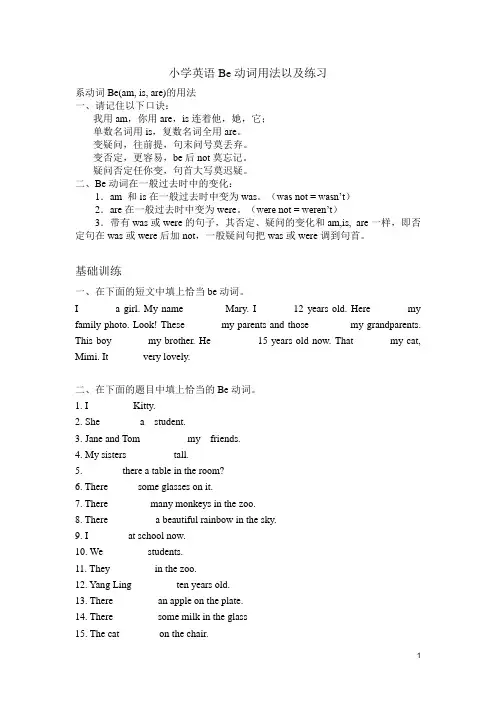
小学英语Be动词用法以及练习系动词Be(am, is, are)的用法一、请记住以下口诀:我用am,你用are,is连着他,她,它;单数名词用is,复数名词全用are。
变疑问,往前提,句末问号莫丢弃。
变否定,更容易,be后not莫忘记。
疑问否定任你变,句首大写莫迟疑。
二、Be动词在一般过去时中的变化:1.am 和is在一般过去时中变为was。
(was not = wasn’t)2.are在一般过去时中变为were。
(were not = weren’t)3.带有was或were的句子,其否定、疑问的变化和am,is, are一样,即否定句在was或were后加not,一般疑问句把was或were调到句首。
基础训练一、在下面的短文中填上恰当be动词。
I ______ a girl. My name _______ Mary. I ______ 12 years old. Here ______ my family photo. Look! These ______ my parents and those _______ my grandparents. This boy ______ my brother. He ________ 15 years old now. That ______ my cat, Mimi. It ______ very lovely.二、在下面的题目中填上恰当的Be动词。
1. I ________ Kitty.2. She _______ a student.3. Jane and Tom _________my friends.4. My sisters _______ tall.5. _______ there a table in the room?6. There _____ some glasses on it.7. There ________many monkeys in the zoo.8. There_________ a beautiful rainbow in the sky.9. I _______ at school now.10. We ________ students.11. They ________ in the zoo.12. Yang Ling ________ ten years old.13. There ________ an apple on the plate.14. There ________ some milk in the glass15. The cat _______ on the chair.16. There _________some water in the glass.17. There __________ some bread on the table.18. Where ________ your friends?29. How old __________ you?练习: 一、用am, is, are 填空1) I _____ a student.2) You ____ a doctor.3) ____she Kitty?4) _____ you Chinese?5) He _____ in Shanghai.6) It_____ a car.7) They ____ cars8) ____ your mother in the room?9) _____your friends in the room?10) What ____ your name?11) These _____ buses.12) Those _____oranges.13) Where _____ your mother?14) How old _____ your sister?15) Where _____ you ?照样子改写句子例题:1. I __am___ a boy. __Are_ you a boy? No, I _am__ not.2. The girl______ Jack’s sister. ______________________________________3. The dog _______ tall and fat. ______________________________________4. Miss Zhang _______ a teacher. ____________________________________5. ______ your brother in the classroom? __________________________________6. She ______ at home. ______________________________________7. How _______ your father? ______________________________________8. Mike and Kitty ______ in the zoo. ___________________________________9. This______ my dress. ___________________________________10. They _____ nice flowers. ___________________________________11. That ______ my red skirt. ___________________________________12. The books ______ on the desk. ___________________________________13. Here ______ a card for you. ___________________________________14. Here ______ some sweaters for you.___________________________________15. Who ______ I? ___________________________________16. Who ______ you?___________________________________17. Who ______ she?___________________________________18.Who ______ Peter?___________________________________用be(is, am,are)动词的适当形式填空。
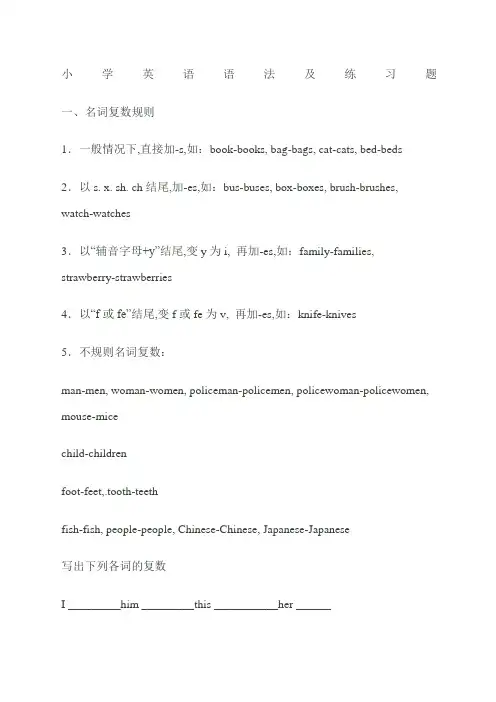
小学英语语法及练习题一、名词复数规则1.一般情况下,直接加-s,如:book-books, bag-bags, cat-cats, bed-beds 2.以s. x. sh. ch结尾,加-es,如:bus-buses, box-boxes, brush-brushes, watch-watches3.以“辅音字母+y”结尾,变y为i, 再加-es,如:family-families, strawberry-strawberries4.以“f或fe”结尾,变f或fe为v, 再加-es,如:knife-knives5.不规则名词复数:man-men, woman-women, policeman-policemen, policewoman-policewomen, mouse-micechild-childrenfoot-feet,.tooth-teethfish-fish, people-people, Chinese-Chinese, Japanese-Japanese写出下列各词的复数I _________him _________this ___________her ______watch _______child _______photo ________diary ______day________ foot________ book_______ dress ________tooth_______ sheep ______box_______ strawberry _____thief _______yo-yo ______ peach______ sandwich ______man______ woman_______ paper_______ juice___________water________ milk________ rice__________ tea__________二、一般现在时一般现在时基本用法介绍No. 1一般现在时的功能1.表示事物或人物的特征、状态;如:The sky is blue.天空是蓝色的;2.表示经常性或习惯性的动作;如:I get up at six every day.我每天六点起床;3.表示客观现实;如:The earth goes around the sun.地球绕着太阳转;一般现在时的构成1. be动词:主语+beam,is,are+其它;如:I am a boy.我是一个男孩;2.行为动词:主语+行为动词+其它;如:We study English.我们学习英语;当主语为第三人称单数he, she,it时,要在动词后加"-s"或"-es";如:Mary likes Chinese.玛丽喜欢汉语;一般现在时的变化1. be动词的变化;否定句:主语+ be + not +其它;如:He is not a worker.他不是工人;一般疑问句:Be +主语+其它;如:-Are you a student-Yes. I am. / No, I'm not.特殊疑问句:疑问词+一般疑问句;如:Where is my bike2.行为动词的变化;否定句:主语+ don't doesn't +动词原形+其它;如:I don't like bread.当主语为第三人称单数时,要用doesn't构成否定句;如:He doesn't often play.一般疑问句:Do Does +主语+动词原形+其它;如:- Do you often play football- Yes, I do. / No, I don't.当主语为第三人称单数时,要用does构成一般疑问句;如:- Does she go to work by bike- Yes, she does. / No, she doesn't.特殊疑问句:疑问词+一般疑问句;如:How does your father go to work 动词+s的变化规则1.一般情况下,直接加-s,如:cook-cooks, milk-milks2.以s. x. sh. ch. o结尾,加-es,如:guess-guesses, wash-washes,watch-watches, go-goes3.以“辅音字母+y”结尾,变y为i, 再加-es,如:study-studies一般现在时用法专练:一、写出下列动词的第三人称单数drink ________ go _______ stay ________ make ________look _________ have_______ pass_______ carry ____ come________ watch______ plant_______ fly ________ study_______ brush________ do_________ teach_______二、用括号内动词的适当形式填空;1. He often ________have dinner at home.2. Daniel and Tommy _______be in Class One.3. We _______not watch TV on Monday.4. Nick _______not go to the zoo on Sunday.5. ______ they ________like the World Cup6. What _______they often _______do on Saturdays7. _______ your parents _______read newspapers every day8. The girl _______teach us English on Sundays.9. She and I ________take a walk together every evening.10. There ________be some water in the bottle.11. Mike _______like cooking.12. They _______have the same hobby.13. My aunt _______look after her baby carefully.14. You always _______do your homework well.15. I _______be ill. I’m staying in bed.16. She _______go to school from Monday to Friday.17. Liu Tao _______do not like PE.18. The child often _______watch TV in the evening.19. Su Hai and Su Yang _______have eight lessons this term.20. -What day _______be it today-It’s Saturday.三、按照要求改写句子1. Daniel watches TV every evening.改为否定句___________________________________________________2. I do my homework every day.改为一般疑问句,作否定回答________________________________________________________ 3. She likes milk.改为一般疑问句,作肯定回答___________________________4. Amy likes playing computer games.改为一般疑问句,作否定回答___________________________________________________5. We go to school every morning.改为否定句_______________________________________________________ 6. He speaks English very well.改为否定句___________________________________________________7. I like taking photos in the park.对划线部分提问________________________________________________________ 8. John comes from Canada.对划线部分提问___________________________________________________9. She is always a good student.改为一般疑问句,作否定回答________________________________________________________ 10. Simon and Daniel like going skating.改为否定句___________________________________________________五、改错划出错误的地方,将正确的写在横线上1. Is your brother speak English __________________2. Does he likes going fishing __________________3. He likes play games after class. __________________4. Mr. Wu teachs us English. __________________5. She don’t do her homework on Sundays. _________________三、现在进行时1.现在进行时表示现在正在进行或发生的动作,也可表示当前一段时间内的活动或现阶段正在进行的动作;2.现在进行时的肯定句基本结构为be+动词ing.3.现在进行时的否定句在be后加not;4.现在进行时的一般疑问句把be动词调到句首;5.现在进行时的特殊疑问的基本结构为:疑问词不达意+ be + 主语+ 动词ing但疑问词当主语时其结构为:疑问词不达意+ be + 动词ing动词加ing的变化规则1.一般情况下,直接加ing,如:cook-cooking2.以不发音的e结尾,去e加ing,如:make-making, taste-tasting3.如果末尾是一个元音字母和一个辅音字母,双写末尾的辅音字母,再加ing,如:run-running, stop-stopping现在进行时专项练习:一、写出下列动词的现在分词:play________ run__________ swim _________make__________go_________ like________ write________ _ski___________read________ have_________ sing ________ dance_________put_________ see________ buy _________ love____________live_______ take_________ come ________ get_________stop_________ sit ________ begin________ shop___________二、用所给的动词的正确形式填空:1.The boy __________________ drawa picture now.2. Listen .Some girls _______________ singin the classroom .3. My mother _________________ cook some nice food now.4. What _____ you ______ do now5. Look . They _______________ have an English lesson .6.They ____________not ,water the flowers now.7.Look the girls ________________dance in the classroom .8.What is our granddaughter doing She _________listen to music.9. It’s 5 o’clock now. We _____________havesupper now10.______Helen____________wash clothes Yes ,she is .三、句型转换:1. They are doing housework .分别改成一般疑问句和否定句__________________________________________________________________________________________________________________________ 2.The students are cleaning the classroom . 改一般疑问句并作肯定和否定回答________________________________________________________________ _________________________________________________________________ _3.I’m playing the football in the playground .对划线部分进行提问________________________________________________________________ _4.Tom is reading books in his study . 对划线部分进行提问四、将来时理论及练习一、概念:表示将要发生的动作或存在的状态及打算、计划或准备做某事;句中一般有以下时间状语:tomorrow, next dayweek, month, year…,soon, the day after tomorrow后天等;二、基本结构:①be going to + do;②will+ do.三、否定句:在be动词am, is, arel后加not或情态动词will后加not成won’t;例如:I’m going to have a picnic this afternoon.→ I’m not going to have a picnic this afternoon.四、一般疑问句:be或will提到句首,some改为any, and改为or,第一二人称互换;例如:We are going to go on an outing this weekend. → Are you going to go on an outing this weekend五、对划线部分提问;一般情况,一般将来时的对划线部分有三种情况;1. 问人;Who 例如:I’m going to New York soon. →Who’s going to New York soon.2. 问干什么;What … do.例如:My father is going to watch a race with me thisafternoon. →What is your father going to do with you this afternoon.3. 问什么时候;When.例如:She’s going to go to bed at nine. →When is she goingto bed六、同义句:be going to = willI am going to go swimming tomorrow明天. = I will go swimming tomorrow. 练习:填空;1. 我打算明天和朋友去野炊;I_____ _______ _________ have a picnic with my friends.I ________ have a picnic with my friends.2. 下个星期一你打算去干嘛我想去打篮球;What ________ ________ _________ _________ _________ next Monday I _______ ______ _____ play basketball.What _________ you do next Monday I ________ play basketball.3. 你妈妈这个周末去购物吗是,她要去买一些水果;_____ your mother _______ ________ go shopping this ___________Yes, she _________. She ______ ________ __________ buy some fruit.4. 你们打算什么时候见面;What time _______ you _________ __________ meet改句子;5. Nancy is going to go camping.改否定Nancy ________ going to go camping.6. I’ll go and join them.改否定I _______ go ______ join them.7. I’m going to get up at 6:30 tomorrow.改一般疑问句________ _______ ________ to get up at 6:30 tomorrow8. We will meet at the bus stop at 10:30.改一般疑问句_______ ________ meet at the bus stop at 10:30.9. She is going to listen to music after school.对划线部分提问________ _______ she ________ ________ _________ after school10. My father and mother are going to see a play the day after tomorrow.同上_________ _________ going to see a play the day after tomorrow.用所给词的适当形式填空;11. Today is a sunny day. We ___________________ have a picnic this afternoon.12. My brother _______________ go to Shanghai next week.13. Tom often ______________go to school on foot. But today is rain. He ______________ go to school by bike.14. What do you usually do at weekends I usually __________ watch TV and ____________catch insects15. It’s Friday today. What _____she _________ do this weekend She ______________ watch TV and _____________ catch insects.16. What ___________ d0 you do last Sunday I ____________ pick apples on a farm. What ______________ do next Sunday I ______________ milk cows.17. Mary ____________ visit her grandparents tomorrow.18. Liu Tao ____________ fly kites in the playground yesterday.19. David ______________ give a puppet show next Monday.20. I ________________ plan for my study now五、一般过去时1.一般过去时表示过去某个时间发生的动作或存在的状态,常和表示过去的时间状语连用;一般过去时也表示过去经常或反复发生的动作感谢; 2.Be动词在一般过去时中的变化:⑴am 和is在一般过去时中变为was;was not=wasn’t⑵are在一般过去时中变为were;were not=weren’t⑶带有was或were的句子,其否定、疑问的变化和is, am, are一样,即否定句在was或were后加not,一般疑问句把was或were调到句首;3.句中没有be动词的一般过去时的句子否定句:didn’t +动词原形,如:Jim didn’t go home yesterday.一般疑问句:在句首加did,句子中的动词过去式变回原形;如:Did Jim go home yesterday特殊疑问句:⑴疑问词+did+主语+动词原形如:What did Jim do yesterday⑵疑问词当主语时:疑问词+动词过去式如:Who went to home yesterday动词过去式变化规则:1.一般在动词末尾加-ed,如:pull-pulled, cook-cooked2.结尾是e加d,如:taste-tasted3.末尾只有一个元音字母和一个辅音字母的重读闭音节,应双写末尾的辅音字母,再加-ed,如:stop-stopped4.以“辅音字母+y”结尾的,变y为i, 再加-ed,如:study-studied5.不规则动词过去式:am,is-was, are-were, do-did, see-saw, say-said, give-gave, get-got, go-went, come-came, have-had, eat-ate, take-took, run-ran, sing-sang, put-put,make-made, read-read, write-wrote, draw-drew, drink-drank, fly-flew, ride-rode, speak-spoke, sweep-swept, swim-swam, sit-sat过去时练习写出下列动词的过去式isam_________ fly_______ plant________ are ________drink_________ play_______ go________ make ________does_________ dance________ worry________ ask _____taste_________ eat__________ draw________ put ______throw________ kick_________ pass_______ do ________Be动词的过去时练习1Name ____________ No. ______ Date __________一、用be动词的适当形式填空1. I _______ at school just now.2. He ________ at the camp last week.3. We ________ students two years ago.4. They ________ on the farm a moment ago.5. Yang Ling ________ eleven years old last year.6. There ________ an apple on the plate yesterday.7. There ________ some milk in the fridge on Sunday.8. The mobile phone _______ on the sofa yesterday evening.二、句型转换1. It was exciting.否定句:________________________________________________ 一般疑问句:____________________________________________ 肯、否定回答:__________________________________________ 2. All the students were very excited.否定句:________________________________________________一般疑问句:____________________________________________ 肯、否定回答:__________________________________________ 3. They were in his pocket.否定句:________________________________________________ 一般疑问句:____________________________________________ 肯、否定回答:__________________________________________ Be动词的过去时练习2Name ____________ No. ______ Date __________一、用be动词的适当形式填空1. I ______ an English teacher now.2. She _______ happy yesterday.3. They _______ glad to see each other last month.4. Helen and Nancy ________ good friends.5. The little dog _____ two years old this year.6. Look, there ________ lots of grapes here.7. There ________ a sign on the chair on Monday..8. Today _____ the second of June. Yesterday ______ the first of June. It _____ Children’s Day. All the students ______ very excited.二、句型转换1. There was a car in front of the house just now.否定句:________________________________________________一般疑问句:____________________________________________肯、否定回答:__________________________________________肯、否定回答:__________________________________________三、中译英1.我的故事书刚才还在手表旁边;___________________________________________________________ 2.他们的外套上个礼拜放在卧室里了;___________________________________________________________ 3.一会以前花园里有两只小鸟;行为动词的过去时练习1Name ____________ No. ______ Date __________一、用行为动词的适当形式填空1. He _________ live in Wuxi two years ago.2. The cat ________ eat a bird last night.3. We _______ have a party last Halloween.4. Nancy ________ pick up oranges on the farm last week.5. I ________ make a model ship with Mike yesterday.6. They ________ play chess in the classroom last PE lesson.7. My mother _______ cook a nice food last Spring Festival.8. The girls ________ sing and _______ dance at the party.二、句型转换1. Su Hai took some photos at the Sports day.否定句:________________________________________________ 一般疑问句:____________________________________________ 肯、否定回答:__________________________________________2. Nancy went to school early.否定句:________________________________________________ 一般疑问句:____________________________________________ 肯、否定回答:__________________________________________ 3. We sang some English songs.否定句:________________________________________________ 一般疑问句:____________________________________________ 肯、否定回答:__________________________________________ 行为动词的过去时练习2Name ____________ No. ______ Date __________一、用be动词的适当形式填空1. I ______ watch a cartoon on Saturday.2. Her father _______ read a newspaper last night.3. We _________ to zoo yesterday, we _____ to the park. go4. ______ you _______ visit your relatives last Spring Festival5. ______ he _______ fly a kite on Sunday Yes, he ______.6. Gao Shan _______ pull up carrots last National Day holiday.7. I ____________ sweep the floor yesterday, but my mother ______.8. What ______ she _______ find in the garden last morning She __________ find a beautiful butterfly.二、句型转换1. They played football in the playground.否定句:________________________________________________一般疑问句:____________________________________________肯、否定回答:__________________________________________三、中译英1. 格林先生去年住在中国;________________________________________________________2. 昨天我们参观了农场;________________________________________________________3. 他刚才在找他的手机;________________________________________________________ 过去时综合练习1Name ____________ No. ______ Date __________一、用动词的适当形式填空1. It ______ be Ben’s birthday last Friday.2. We all ______ have a good time last night.3. He ________ jump high on last Sports Day.4. Helen ________ milk a cow on Friday.5. She likes ______ newspapers, but she ______ a book yesterday. read6. He _______ football now, but they _______ basketball just now. play7. Jim’s mother _________ plant trees just now.8. _______ they ________ sweep the floor on Sunday No, they _____.9. I _______ watch a cartoon on Monday.10. We ___________ go to school on Sunday.。
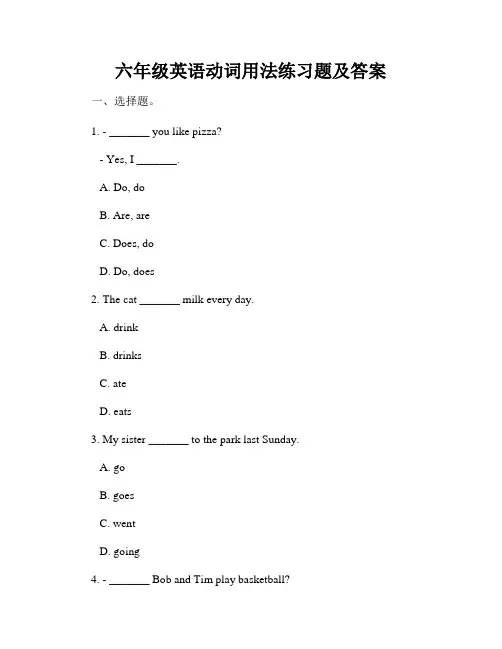
六年级英语动词用法练习题及答案一、选择题。
1. - _______ you like pizza?- Yes, I _______.A. Do, doB. Are, areC. Does, doD. Do, does2. The cat _______ milk every day.A. drinkB. drinksC. ateD. eats3. My sister _______ to the park last Sunday.A. goB. goesC. wentD. going4. - _______ Bob and Tim play basketball?- Yes, they _______.A. Do, doB. Are, areC. Does, doD. Do, does5. We _______ television every evening.A. watchB. watchesC. watchedD. watching二、用括号内所给动词的适当形式填空。
1. He usually _______ (go) swimming on weekends.2. Yesterday, they _______ (visit) the museum.3. The dog _______ (bark) loudly last night.4. We _______ (play) soccer every Saturday.5. She _______ (cook) dinner for her family every day.三、改错题。
下面每句话中有一处错误,请找出并改正。
1. I doesn't like to eat vegetables. _______2. They was playing basketball in the park. _______3. He don't want to go to the party. _______4. We goes to the movies last night. _______5. She have a lot of friends at school. _______答案一、选择题。
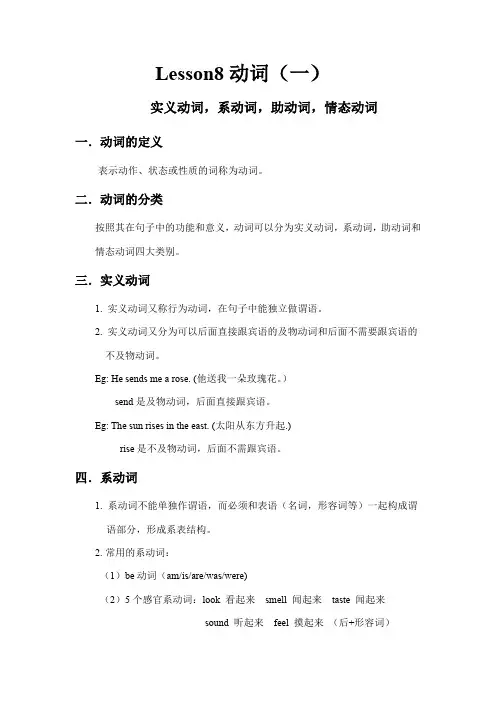
Lesson8动词(一)实义动词,系动词,助动词,情态动词一.动词的定义表示动作、状态或性质的词称为动词。
二.动词的分类按照其在句子中的功能和意义,动词可以分为实义动词,系动词,助动词和情态动词四大类别。
三.实义动词1. 实义动词又称行为动词,在句子中能独立做谓语。
2. 实义动词又分为可以后面直接跟宾语的及物动词和后面不需要跟宾语的不及物动词。
Eg: He sends me a rose. (他送我一朵玫瑰花。
)send是及物动词,后面直接跟宾语。
Eg: The sun rises in the east. (太阳从东方升起.)rise是不及物动词,后面不需跟宾语。
四.系动词1. 系动词不能单独作谓语,而必须和表语(名词,形容词等)一起构成谓语部分,形成系表结构。
2.常用的系动词:(1)be动词(am/is/are/was/were)(2)5个感官系动词:look 看起来smell 闻起来taste 闻起来sound 听起来feel 摸起来(后+形容词)Eg: She looks beautiful today. 她今天看起来很漂亮。
The flowers smell sweet. 这些花闻起来很香。
That sounds good. 那听起来不错。
(3)get/become/turn/go 表变化,后加形容词。
Eg: It gets warmer and warmer. 天气变得越来越暖和。
In fall, the leaves turn yellow. 秋天树叶变黄。
The food goes bad easily in summer. 食物在夏天很容易变坏。
五.助动词1. 助动词本身没有词义,不能单独做谓语,只能和主要动词一起构成谓语动词,表示否定、疑问、时态、语态等语法形式,或用来加强语气。
常用的助动词有:be, do, have, shall, will。
2. 助动词be(1)可用于构成时态,主要是进行时:I am looking at you.(2)可用于构成被动语态: You are being looked.(3)可与动词不定式构成谓语: My job is to look at you every minute.3. 助动词have(1) 构成完成时态:We have learned English for many years.(2)和动词不定式构成谓语,表示因客观环境促使不得不做的事情:We have to learn English very well.4. 助动词do(1) 构成疑问句和否定句:Dose he do his homework after school?(2)用来加强语气:I do want to buy a new car.(3)用来代替动词词组:Write a letter “L” as I do.5.助动词shall构成将来时态,单纯表示未来情况:Shall I begin?6.助动词will构成将来时,用于第一,二,三人称。
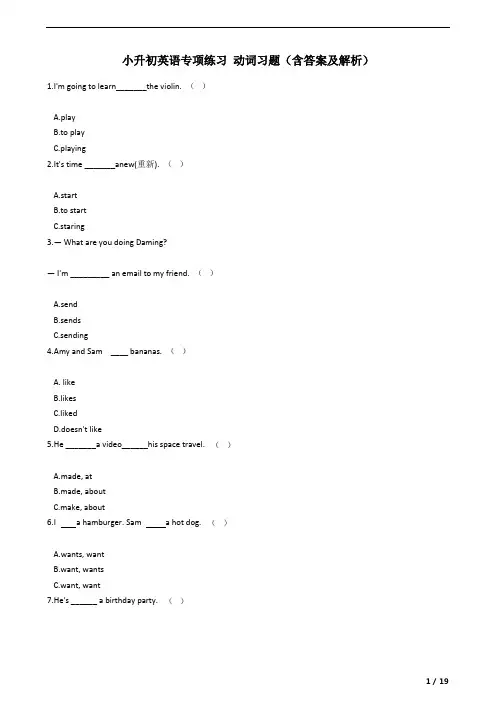
小升初英语专项练习动词习题(含答案及解析)1.I'm going to learn_______the violin. ()A.playB.to playC.playing2.It's time _______anew(重新). ()A.startB.to startC.staring3.— What are you doing Daming?— I'm _________ an email to my friend. ()A.sendB.sendsC.sending4.Amy and Sam ____ bananas. ()A. likeB.likesC.likedD.doesn't like5.He _______a video______his space travel. ()A.made, atB.made, aboutC.make, about6.I a hamburger. Sam a hot dog. ()A.wants, wantB.want, wantsC.want, want7.He's ______ a birthday party. ()A.havingB.haveC.has8.He's riding his bike, but it's ________to rain. ()A.startingB.startC.starts9.I will_______my homework tomorrow. ()A.doB. doesC. did10.We ________ eggs and milk for breakfast yesterday morning. ()A.hadB.haveC.eat11.The green bag has ______ two pockets.A.getB.hotC.got12.The giant very happy. ()A.areB.amC.is13.Little Leo worked hard and a great artist.A.becomingB.becomeC.became14.They _________ from different countries. ()A.amB.areC.is15.Fruit _______ good for your health.A.amB.areC.is16.What ________ the weather like yesterday? ()A.isB.wasC.were17.My cousins _________ Haikou every year. ()A.visitB.visitsC.visited18.Aunt Judy _______ us last week.A.visitB.visitsC.visited19.Lucy is going to _______.A.fishB.fishingC.fishes20.My sister doesn't fishing. She shopping.A.like, likeB.likes, likesC.like, likesD.likes, like21.Do you like to ________?A.play the pianoB.playing the pianoC.play piano22.That restaurant has good sour food. Let’s ________ there.C.to go23.Mr Wang________go fishing this afternoon.A.willB.shallC.be24.It was time ________ clean the house.A.toB.forC.in25.I'm _____ to the radio now.A.listenB.listeningC.listened26.A typhoon was near. Rose closed the windows but she _____ plants outside.A.leaveB.leavingC.left27.Thank you for ______my birthday party.inging toe toe28.I was unhappy because I ________ my wallet.A.loseB.lostC.dropped29.Children _________ play with fire. It's dangerous.A.mustB.mustn't30.We ________ in spring.A.fly kitesB.go skating31.People travel by plane years ago.A.don'tB.doesn'tC.didn't32.The boy to the cinema last weekend.A.goesB.wentC.go33.Thank you for .A.to make the bedB.make the bedsC.making the bed34.I an interesting film last Monday.A.seeB.sawC.sees35.A: How your holiday?B: It was fun.A.wasB.areC.were36.A: What did she do? B: She ______.A.danceB.dancerC.danced37.I like the skirt. I `ll take it, please. “take”指C.带上D.拿走38.Look! The little boy ____ a book _____ sports!A.read, onB.read, ofC.is reading, about39.Why don’t you _______a beautiful dress?A.wearsB.wearC.wore40.I want a present for my cousin.A.takeB.takingC.to take41.I'm a letter.A.writingB.writeC.writeing42.I know.A.notB.don'tC.isn't43.The children are a map of the zoo.A.looking atB.lookingC.watching44.Let's .A.goesB.goC.going45.She some phone calls. ()A.makeB.haveC.tell46.Yesterday I ________ football with my friends. ()A.playedB.playC.plays47.These yellow pants are nice. I'll ______ them! ()A.forB.takeC.taking48.I'm ________ visit my cousin. ()A.going toB.goingC.go49.I'll ______ you to school. ()A.takesB.takingC.take50.Nobody ____________. ()A.knowB.knowsC.known51.I __________ a dragon yesterday. ()A.will drawB.drawC.drew52.I can________. What about you? ()B.swimsC.swim53.Their mothers often ______them. ()A.helpsB.helpingC.help54.Do you want_______be _______our football team? ()A.to, onB.to, inC.at, in55.A boy is _______ by on his jet-ski. ()A.passB.passesC.passing56.He ___________ a balloon in his hand.A.haveB.isC.has57.It's 7 o' clock. He is _____ breakfast.( )A.drinkingB.hasC.eating58.- When do you ________?- Classes finish at 3:50 p.m. ()A.start classB.start classesC.finish classesD.finish class59.— What do you do on the weekend? ()— I like music. I often _____ on the weekend.B.play the pipaC.play sports60.The Whites __________ many places of interest since they came to China.A.have visitedB.will visitC.visitedD.visit二、填空题(共0题;共0分)答案部分第 1 题:【答案】B【考点】动词【解析】【分析】本题含义为:我将要学习拉小提琴。
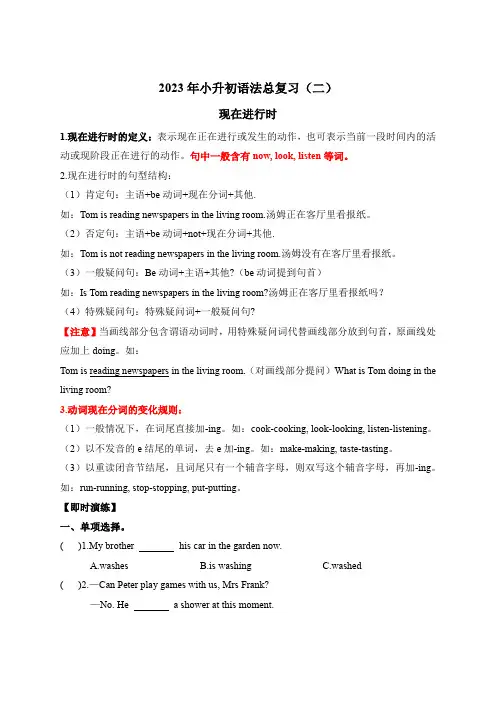
2023年小升初语法总复习(二)现在进行时1.现在进行时的定义:表示现在正在进行或发生的动作,也可表示当前一段时间内的活动或现阶段正在进行的动作。
句中一般含有now, look, listen等词。
2.现在进行时的句型结构:(1)肯定句:主语+be动词+现在分词+其他.如:Tom is reading newspapers in the living room.汤姆正在客厅里看报纸。
(2)否定句:主语+be动词+not+现在分词+其他.如:Tom is not reading newspapers in the living room.汤姆没有在客厅里看报纸。
(3)一般疑问句:Be动词+主语+其他?(be动词提到句首)如:Is Tom reading newspapers in the living room?汤姆正在客厅里看报纸吗?(4)特殊疑问句:特殊疑问词+一般疑问句?【注意】当画线部分包含谓语动词时,用特殊疑问词代替画线部分放到句首,原画线处应加上doing。
如:Tom is reading newspapers in the living room.(对画线部分提问)What is Tom doing in the living room?3.动词现在分词的变化规则:(1)一般情况下,在词尾直接加-ing。
如:cook-cooking, look-looking, listen-listening。
(2)以不发音的e结尾的单词,去e加-ing。
如:make-making, taste-tasting。
(3)以重读闭音节结尾,且词尾只有一个辅音字母,则双写这个辅音字母,再加-ing。
如:run-running, stop-stopping, put-putting。
【即时演练】一、单项选择。
( )1.My brother his car in the garden now.A.washesB.is washingC.washed( )2.—Can Peter play games with us, Mrs Frank?—No. He a shower at this moment.A.is takingB.takesC.took( )3.Tom often swimming. But now he football.A.go; is playingB.goes; playsC.goes; is playing ( )4.—Alice, don’t play the guitar! I on the phone.—Oh, sorry, Mum.A.talkingB.talkC.am taking ( )5.Shh! My sister now.A.sleepsB.is sleepingC.sleep( )6.Listen! Mary an English song in the classroom.A.is singingB.singC.sings二、用所给单词的适当形式填空。
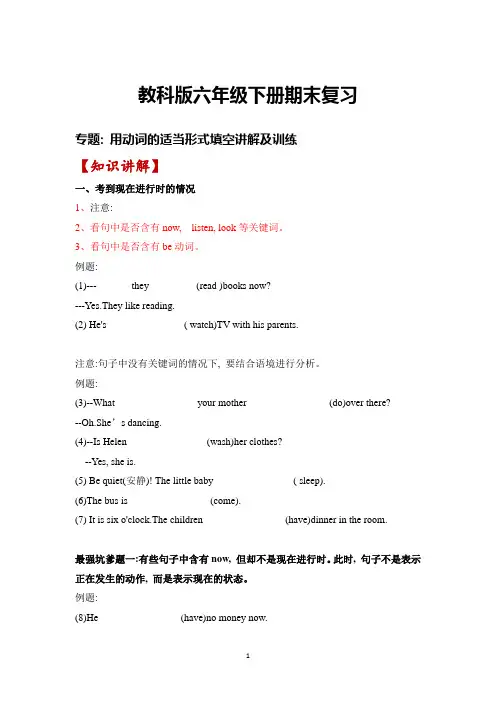
教科版六年级下册期末复习专题: 用动词的适当形式填空讲解及训练【知识讲解】一、考到现在进行时的情况1、注意:2、看句中是否含有now, listen, look等关键词。
3、看句中是否含有be动词。
例题:(1)---_______they_________ (read )books now?---Yes.They like reading.(2) He's_______________ ( watch)TV with his parents.注意:句子中没有关键词的情况下, 要结合语境进行分析。
例题:(3)--What________________ your mother________________ (do)over there?--Oh.She’s dancing.(4)--Is Helen________________(wash)her clothes?--Yes, she is.(5) Be quiet(安静)! The little baby________________( sleep).(6)The bus is________________ (come).(7) It is six o'clock.The children________________ (have)dinner in the room.最强坑爹题一:有些句子中含有now, 但却不是现在进行时。
此时, 句子不是表示正在发生的动作, 而是表示现在的状态。
例题:(8)He________________ (have)no money now.(9) Now I________________ ( love)my life in Guangzhou.(10) She________________ (be )a teacher now.(11)________________ (be)there a book on the desk now?二、考到一般现在时的情况注意:判断句中是否含有usually, often, never, every等关键词。
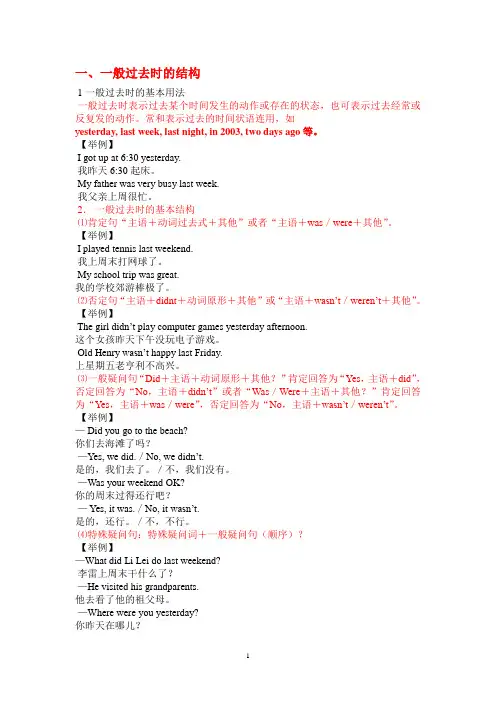
一、一般过去时的结构1一般过去时的基本用法一般过去时表示过去某个时间发生的动作或存在的状态,也可表示过去经常或反复发的动作。
常和表示过去的时间状语连用,如y esterday, last week, last night, in 2003, two days ago等。
【举例】I got up at 6:30 yesterday.我昨天6:30起床。
My father was very busy last week.我父亲上周很忙。
2.一般过去时的基本结构⑴肯定句“主语+动词过去式+其他”或者“主语+was/were+其他”。
【举例】I played tennis last weekend.我上周末打网球了。
My school trip was great.我的学校郊游棒极了。
⑵否定句“主语+didnt+动词原形+其他”或“主语+wasn’t/were n’t+其他”。
【举例】The girl didn’t play computer games yesterday afternoon.这个女孩昨天下午没玩电子游戏。
Old Henry wasn’t happy last Friday.上星期五老亨利不高兴。
⑶一般疑问句“Did+主语+动词原形+其他?”肯定回答为“Yes,主语+did”,否定回答为“No,主语+didn’t”或者“Was/Were+主语+其他?”肯定回答为“Yes,主语+was/were”,否定回答为“No,主语+wasn’t/were n’t”。
【举例】— Did you go to the beach?你们去海滩了吗?—Yes, we did./No, we did n’t.是的,我们去了。
/不,我们没有。
—Was your weekend OK?你的周末过得还行吧?— Yes, it was./No, it wasn’t.是的,还行。
/不,不行。
⑷特殊疑问句:特殊疑问词+一般疑问句(顺序)?【举例】—What did Li Lei do last weekend?李雷上周末干什么了?—He visited his grandparents.他去看了他的祖父母。
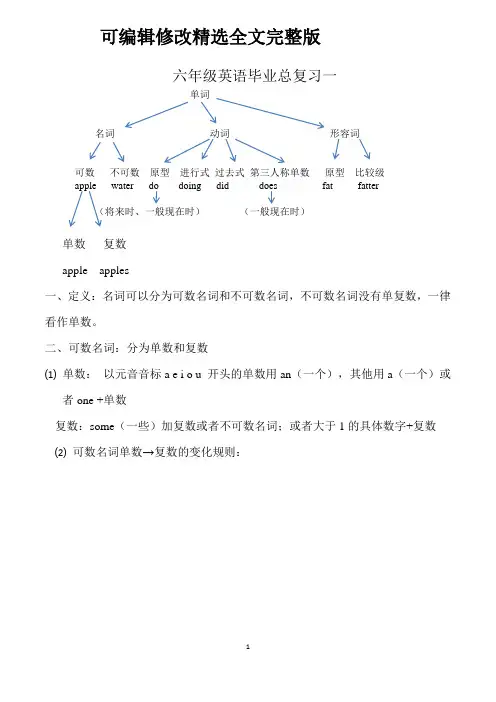
可编辑修改精选全文完整版六年级英语毕业总复习一单词名词动词形容词可数不可数原型进行式过去式第三人称单数原型比较级apple water do doing did does fat fatter(将来时、一般现在时)(一般现在时)单数复数apple apples一、定义:名词可以分为可数名词和不可数名词,不可数名词没有单复数,一律看作单数。
二、可数名词:分为单数和复数⑴单数:以元音音标a e i o u 开头的单数用an(一个),其他用a(一个)或者one +单数复数:some(一些)加复数或者不可数名词;或者大于1的具体数字+复数⑵可数名词单数→复数的变化规则:三、不可数名词:以下词为常为不可数名词,他们的复数形式就是他们本身。
water 水milk牛奶tea 茶rice米饭juice 果汁bread面包meat 肉四、人称代词:be 动词am , is , are的选择: 单数用is , 复数用are,I 用am , you 用are.练习题一、选择a或an或some.pen bag apple big applebananas orange books water二、写出下列各词的复数.watch _______ child _______ day________ foot________ book_______ sheep ______ box_______ peach______ man______fish _______ paper_______三、选择:1、There on the wall .They are very beautiful.A. are photoesB. are photos2、That’s book.A. anB. a3、There some in the river.A. are, fishesB. are ,fish4. Would you like _______ ,please?A. some watersB. some water5、Do you want to drink much ?A、a milkB、milk四、选择be(am is are ) 填空。
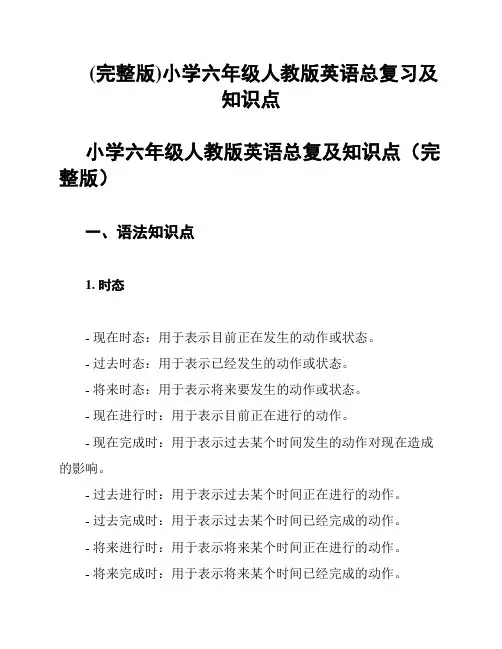
(完整版)小学六年级人教版英语总复习及知识点小学六年级人教版英语总复及知识点(完整版)一、语法知识点1. 时态- 现在时态:用于表示目前正在发生的动作或状态。
- 过去时态:用于表示已经发生的动作或状态。
- 将来时态:用于表示将来要发生的动作或状态。
- 现在进行时:用于表示目前正在进行的动作。
- 现在完成时:用于表示过去某个时间发生的动作对现在造成的影响。
- 过去进行时:用于表示过去某个时间正在进行的动作。
- 过去完成时:用于表示过去某个时间已经完成的动作。
- 将来进行时:用于表示将来某个时间正在进行的动作。
- 将来完成时:用于表示将来某个时间已经完成的动作。
2. 语法结构- 名词:用于表示人、动物、物体、地点等。
- 动词:用于表示动作或状态。
- 形容词:用于描述名词的特征或状态。
- 副词:用于修饰动词、形容词或其他副词。
- 介词:用于表示位置、时间或关系等。
- 代词:用于替代名词。
- 数词:用于表示数量。
- 冠词:用于限定名词的范围。
- 连词:用于连接词语、短语或句子。
3. 句子结构- 主语:句子中执行动作或承受动作的人或事物。
- 谓语:句子中说明主语动作或状态的部分。
- 宾语:句子中接受动作的人或事物。
- 定语:用于修饰名词或代词的成分。
- 状语:用于修饰动词、形容词、副词或整个句子的成分。
- 表语:用于说明主语的状态或特征的部分。
二、总复内容1. 单词- 请根据教材中的单词表,复并牢记相关的单词拼写和意思。
2. 句子- 复教材中的对话和句子,理解并掌握其基本意思和用法。
3. 对话- 复教材中的对话,掌握其中的日常生活用语和表达方式。
4. 语法- 复教材中的语法知识点,加深对时态、语法结构和句子成分的理解。
三、研究方法1. 多听多说- 多听英语教材、歌曲或英语广播,提高听力水平。
- 多说英语,练口语表达和语音准确性。
2. 多读多写- 多读英语教材、故事书等,提高阅读理解能力。
- 多写英语作文,锻炼自己的写作能力和语法运用。
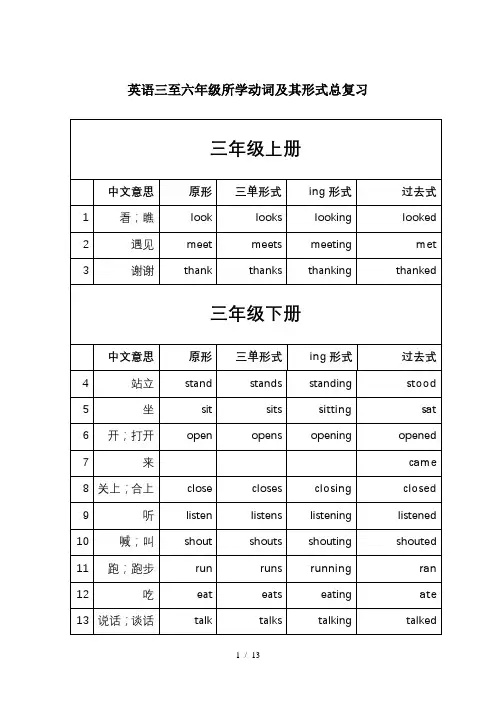
英语三至六年级所学动词及其形式总复习Be动词:原形be;is, am的过去式是was;are的过去式是were.助动词:原形do;三单式does;过去式did情态动词有:can(能够;可以), could(能够),may(可以;也许), must(必须),shall(必须;应该;可以;将要;), should(应该),will(将要), would(愿意;将要)句型转换的方法Be动词:原形be;现在式is, am, are;;过去式was, were情态动词有:can, could, may, must, shall, should, will, would…助动词:原形do;三单式does;过去式did一、肯定句否定句1. 加not①有be动词,直接在be动词后面加not,可缩写。
②有情态动词,直接在情态动词后加not,可缩写。
③无be无情,助动词don’t/doesn’t/didn’t来帮忙,句中动词用原形。
2. 改:①some改成any, ②and改成or,③too改成either例:①I am at home. I am not at home.②I can dance well. I can’t dance well..二、肯定句一般疑问句1. 提①有be提be(有be动词,将be动词提到句首)②有情提情(有情态动词,将情态动词提到句首)③无be无情,助动词来帮忙(没有be动词,也没有情态动词,就在句首加上助动词do/does/did,句中动词用原形)2.改①第一、第二人称互换(I, me, we, us ---you, my, our---your②some改成any, and改成or③句号改成问号例:①I am at home.Are you at home? Yes, I am. / No, I’m not.②I can dance well.Can you dance well? Yes, I can. / No, I can’t.三、肯定句特殊疑问句(对划线部分提问)1. 确定疑问词(将划线部分换成对应的疑问词)人——who/whom 事,物——what地点——where 时间——when / what time原因——why 数量——how many频率——how often 价钱——how much颜色——what colour 年龄——how old长度——how long 距离——how far还有how, which, whose等。
六年级英语语法复习——be动词的用法一、口诀:我用am, 你用are, is用在他她它,复数全用are。
例题:1. I ______ a boy. ______ you a boy? No, I _____ not.2. The girl______ Jack's sister.3. The dog _______ tall and fat.4.The jeans ______ on the desk.二、有be动词的肯定句和否定句I am from London. I am not from London.He is a teacher. He is not a teacher.She is in the dining room. She is not in the dining room.My hair is long. My hair is not long.Her eyes are small. Her eyes are not small.归纳:在有be动词的句子中,改否定句时只要在be动词______加上_____。
三、有be动词的一般疑问句Am I a Chinese? Yes, you are. No, you aren’t.Are they American? Yes, they are. No, they aren’t.Is the cat fat? Yes, it is. No, it isn’t.四、 Be动词在一般过去时中的变化:am--was is --was are--were⑴am 和is在一般过去时中变为was。
(was not=wasn’t)⑵are在一般过去时中变为were。
(were not=weren’t)⑶带有was或were的句子,其否定、疑问的变化和is, am, are一样,即否定句在was或were后加not,一般疑问句把was或were调到句首。
小学英语四种时态复习一提到时态,就必然用到动词。
首先要明确两个概念:动词有五种形式,即:原形(形式),第三人称单数(形式),过去式(形式),现在分词(形式),过去分词(形式)。
小学阶段,句子有以下四种常见时态,即:一般现在时态;一般过去时态;一般将来时态;现在进行时态。
式,意思就是各种不同的形式,是对应着动词来说的;时态,意思就是表达各种不同的时间的事情,是对应着句子来说的。
式与时,先搞懂区别。
一、一般现在时态一般现在时用法口诀一般现在时,every, usually, often, sometimes.第一、二人称和复数,动词原形不变换。
除了I, you,复数外,动词后加s(es)别忘怀。
要变一般疑问句,be动词提前很容易。
若是没有be动词,Do和Does开头要注意。
否定句,很简单,not 在be 动词后面站。
若是没有be动词,do, does加not 要牢记。
请把这些规律记,一般现在时没问题。
一般现在时态,可能是两种意思。
第一,表示经常性的动作,常与often, sometimes, usually, every day, everyweek, every month, every year等表示频率的副词连用。
例如:He often goes swimming in summer.I usually go to work by bike.Sam visits China every year.第二,表示现在的状态。
如:My mother is a worker.There is a computer in our classroom.注意问题:be (am, is, are) 动词就是独立的谓语动词,一个句子中有了be(am, is, are) 就有了谓语动词了。
句子中不能同时出现两个谓语动词。
不少同学经常出这样的错误:The boy is often eats hamburgers.(错)应改为: The boy often eats hamburgers.二、现在进行时态正在进行时态口诀现在分词用途多,进行时态不用说。
六年级英语语法总复习(课堂用练习题答案)2一般现在时一. 意义:表示经常发生的事情,动作或存在的状态二. 构成及变化1.be动词的变化。
肯定句:主语+be(am,is,are)+其它。
如:I am a boy。
我是一个男孩。
否定句:主语+ be + not +其它。
如:He is not a worker。
他不是工人。
一般疑问句:Be +主语+其它。
如:-Are you a student? -Yes. I am. / No, I'm not。
特殊疑问句:疑问词+一般疑问句。
如:Where is my bike?2. 行为动词的变化。
当主语为第一,二人称及复数时,助动词为do肯定句:主语+动词原形(+其它)。
如:We often play basketball after school。
否定句:主语+ don't+动词原形(+其它)。
如:we don’t play basketball after school。
一般疑问句:Do +主语+动词原形+其它?如:Do you often play basketball after school l? Yes, we do. / No, we don't。
特殊疑问句:疑问词+以do开头的一般疑问句?如:What do you often do after school ?当主语为第三人称单数时,助动词为does肯定句:主语+动词三单式(+其它)。
如:He swims well。
否定句:主语+ doesn’t+动词原形(+其它)。
如:He doesn’t swim well。
.一般疑问句:Does +主语+动词原形+其它。
如:Does he swim well ? Yes, he does. / No, he doesn't。
特殊疑问句:疑问词+以does开头的一般疑问句?如:How does your father go to work?三。
小学英语语法及习题一、名词复数规则1.一般情况下,直接加-s,如:book-books,bag-bags,cat-cats,bed-beds2.以s.x.sh.ch结尾,加-es,如:3.以4.以5eI_________him_________this___________her______ watch_______child_______photo________diary______ day________foot________book_______dress________ tooth_______sheep______box_______strawberry_____ thief_______yo-yo______peach______sandwich______man______woman_______paper_______??????juice___________ water________milk________rice__________tea__________ 二、一般现在时一般现在时基本用法介绍【No.1】一般现在时的功能或"-es"一般现在时的变化1.be动词的变化。
否定句:主语+be+not+其它。
如:Heisnotaworker.他不是工人。
一般疑问句:Be+主语+其它。
如:-Areyouastudent?-Yes.Iam./No,I'mnot.特殊疑问句:疑问词+一般疑问句。
如:Whereismybike?2.行为动词的变化。
否定句:主语+don't(doesn't)+动词原形(+其它)。
如:动词12.以s.x.sh.ch.o结尾,加-es,如:guess-guesses,wash-washes,watch-watches,go-goes3.以“辅音字母+y”结尾,变y为i,再加-es,如:study-studies 一般现在时用法专练:一、写出下列动词的第三人称单数drink________go_______stay________make________look_________have_______pass_______????carry____ come________?????watch______plant_______fly________ study_______brush________do_________????teach_______ 二、用括号内动词的适当形式填空。
六年级英语总复习专项练习语音动词一、语音练习:A B C D< >1. name table apple date< >2. that mango many carry< >3. wallet wash water want< >4. have dance garden after< >5. any desk sweater calculator < >6. watermelon short orange forty< >7. anything many festival any< >8. panda orange camera Japan< >9. ask answer can vase< >10. fever people me twelve < >11. these evening relative meet < >12. second next excuse head< >13. else lesson vest Chinese < >14. very different February subject< >15. science mine child children< >16. trip fridge trick minus< >17. give insect eleven idea< >18. diamond climb fly swing< >19. note not those close< >20. only over on open< >21. kitchen this ring sign< >22. also stove sofa stop< >23. smoke moment piano hobby< >24. from job popular glove< >25. worry son wrong often< >26. who shoe woman move< >27. window boat computer clothes< >28. use us puzzle under< >29. usually student excuse dumpling < >30. hungry uncle beautiful Monday < >31. ruler blue June put< >32. August autumn busy minus1 / 10< >33. start quarter farmer party< >34. large cartoon popular scarf< >35. daughter aunt ball your< >36. draw small orange morning < >37. quarter draw March door< >38. way day Tuesday birthday< >39. always play says say< >40. Friday Saturday today Wednesday < >41. read clean ready teach< >42. head breakfast break sweater< >43. read bread any red< >44. great they eight bread< >45. idea theatre peach theatre < >46. jeans green policeman head< >47. hear dear near bear< >48. pear there here theirs< >49. early learn bird nearby < >50. here where there chair二、动词练习:1. 用am, is ,are, was, were 填空:1. ______ you all from China? Oh, no, Miss Gao. Only I _____ from China. Mingzi _____ from Japan. David ____ from England. We ____ all good friends.2. This ____ Yang Ling. That _____ his bag. It ____ new.3. Here ____ your hat. Where ___ are shoes?4. ____ we all here today? No, Tom and Jim ____ not here.5. Those ____ her socks. Where _____ mine?6. What’s ______ the man’s job? He _____ a worke r.7. There _____ a cat under the chair a moment ago, but there ______ not a cat now.8. ______ there any cakes in the box yesterday? Yes, there _____ some.9. My parents ______ young twenty years ago. Now they _____ old. I love them very much.10. Su Yang, what _____ fifty and fifteen? It ______ sixty-five. 2. 写出下列动词的第三人称单数, 现在分词和过去式:2 / 101. work _____ ______ _____2. go _____ ______ _____3. ask _____ ______ _____4.make _____ ______ _____5. do _____ ______ _____6. have _____ ______ _____7. stop _____ ______ _____8.eat _____ ______ _____9. drink _____ ______ _____10.sing _____ ______ _____3. 用动词的适当形式填空1. He _________ <live> in America two years ago.2. The boy ________ <listen> to the teacher carefully last week.3. We _______ <watch> a Japanese cartoon last Friday.4. Nancy ________ <pick> up oranges on the farm last week.5. I ________ <pull> up <carrot> with Mike yesterday.6. They ________ <play> chess in the classroom last PE lesson.7. My mother _______ <cook> a nice food last Spring Festival 〔春节.8. The girls _______ <dance> at the party last Wednesday .9.The students ________ <study> very hard last month<月>.10. My parents _____ <plan > to have a good weekend last Thursday.11. We <visit > our grandparents last Sunday.My grandparents <be> very happy to see us .12. The children <water> the flowers and <collect > eggs on the farm three days ago . They <be> very exited.13. Su Yang <clean> her house with Su Hai two days ago .14. Mike < taste > a lot of oranges on the farm when he was ten years old.15. Yesterday evening , I <walk > in the park with my cousin .There <be> lots of people in the park.16. Ben <ask> his mother many questions when he was five years old.1. swim _____ ______ _____4. 用动词的适当形式填空3 / 101. I ______ <watch> a Chinese cartoon last Saturday.2. Helen _______ <talk> the National Day with her father last night.3. Our teacher <use> the computer to give us an English lesson yesterday.4. ______ you _______ <visit> your relatives<亲戚> last Spring Festival〔春节?5. ______ he _______ <fly> a kite last Sunday? Yes, he ______.6. Ben _______ <pull> up carrots last National Day holiday.7. My mother _______<work> yesterday, but my father ______<not><work>.8. What ____ she _____ <do> in the garden last morning? She _____<play> the guitar.9. My sister <wash> her dress the day before yesterday.10.We <go> to school last Saturday. We <have> a party at school.5. 用动词的适当形式填空:1. My brother ______ <go> to school at half past seven every day.2. I ______ <read> my English book every evening.3. How does he spend ______ <he> weekends? He often _____ <watch> cartoons.4. What does ______ <you> mother usually do on Sunday? She usually _____<wash>clothes.5. _____<be> there any books in the bookcase?6. There _____ <be> some water in the glass.7. Where is David? He _______<sit > in the room now.8. What ____<do > you do last Sunday? We ______<watch> a film.9. I like _______<play> football. He ______<like> watching TV.10. Where is the camera? It _______<is > on the desk a momentago. Now it _____ in the bag.11. There ______<be> a lot of _________ <diary> on the table.12. You shouldn’t ______<put> your coffee near the computer.13.Would you like _______ <take> photos? I want_________<take> photos.4 / 1014.Where _____<be> the mirror now? It _____<be> there just now.15.____ your sister ______<like> Science? No, but she ______<like> Maths.16. What _____ <do> that sign mean? It _______<mean> we shouldn’t ______<make> noise here.17.Mr Green ___________ <talk> to his students about Christmas now.st weekend, He Yi ____________ <play> football and ____________ <listen> to the music.19.What ____ this sign _______ <mean>? It means we should keep off the grass.20._____ you _________ <get> up early this morning? Yes, I_________ <do>.21.The boys _______________ <play> football now.22.My brother and I can ______ football well. We _____ football with our friends last Sunday.23. Mr Brown is a _____. He ____ English in a primary school. 6. 用动词的适当形式填空1. I ______to school from Monday to Friday. My brother often _______to school with me. Yesterday we _______to school together. We like ________to school very much. < go >2.They usually _______lunch at home. But last week, they ____lunch at school. < have >3.That______my English book. It _____new. But now it _____not here. It ______there a moment ago. < be >4.My sister likes ________very much. She often _______at our school festival. Last term, she _______a lot of songs in the school hall. She _____beautifully. < sing >5.What _____ he usually _______on Sunday? He usually _______his homework. Look! He __________his homework now. _______he _______his homework last Sunday? Yes, he_______. < do >6. Do people usually_______ moon cakes at Mid-autumn Festival? Yes, they do. Did you ________moon cakes last Mid-autumn Festival? Yes, I did. I _______a lot of delicious moon cakes. <5 / 107. -----How ______you? -----I _____fine. Thank you.-----Where _____you yesterday?----I ____at home with my family-----_______your father at home, too?----- Yes, he______. < be >8.Jane is a dancer. She ________every day.Look! She ________________now. < dance >9. National Day is_________. A lot of people _______to Beijingtwo weeks ago. < come >10.She often ________shopping with her mother. She likes______shopping in the shop. She _______shoppingyesterday. < go >代词练习一、把下面表格填写完整6 / 10二、根据括号中的要求给出下列代词的适当形式。
PEP小学英语语法要点及习题一、名词复数写出下列各词的复数I(we) him(them) this (these)her (their) watch(watches) child (children) photo (photos) diary(diaries) day(days) foot(feet) books dresses teeth sheep boxes strawberries peaches sandwiches men women paper juice water milk rice tea二、一般现在时:答案写出下列动词的第三人称单数drinks goes stays makes looks has passes carriescomes watches plants flies studiesbrushes does teaches用括号内动词的适当形式填空。
1. He often has(have) dinner at home.2. Daniel and Tommy are(be) in Class One.3.We __don' t watch(not watch) TV on Monday.4.Nick doesn′ t go(not go) to the zoo on Sunday.5.Do they like(like) the World Cup?6.What __do they often do__(do) on Saturdays?7.Do your parents read(read) newspapers every day?8.The girl teaches(teach) us English on Sundays.9.She and I take(take) a walk together every evening.10.T here is__(be) some water in the bottle.11. Mike __likes__(like) cooking.12.T hey __have__(have) the same hobby.13. My aunt looks(look)after her baby carefully.14.Y ou always __do(do) your homework well.15. I am__(be) ill. I'm staying in bed.16.S he goes(go) to school from Monday to Friday.17. Liu Tao __does_(do) not like PE.18.T he child often watches(watch) TV in the evening.19.S u Hai and Su Yang __have__(have) eight lessons this term.20.—What day is__(be) it today?— It's Saturday.按照要求改写句子1.Daniel doesn' t watch TV every evening.2.Do you do your homework every day? Yes, I do.3.Does she like milk? Yes, she does.4.Does Amy like playing computer games? No, she doesn' t.5.We don' t go to school every morning.6.He doesn' t speak English very well.7.What do you like in the park.8.John comes from Canada.(对划线部分提问)9.She is always a good student. 改为一般疑问句,作否定回答)10.S imon and Daniel like going skating.(改为否定句) 改错(划出错误的地方,将正确的写在横线上)English?_________________ 2.Does he likes going fishing?_________________ 3.He likes play games after class._________________ 4.Mr. Wu teachs us English._________________ 5. She don't do her homework on Sundays.二、现在进行时:写出下列动词的现在分词:play ___ run _____ s wim _____ m akego like write ski read __ have_ sing __ dance_ __ put __ __ see __ __ buy ___ ___ lovelive take come get stop sitbegin shop用所给的动词的正确形式填空:1 .The boy( draw)a picture now.2 . Listen . Some girls( sing)in the classroom .3 . My mother( cook )some nice food now.4 . What you( do ) now?5 . Look . They( have) an English lesson .6 .They(not , water) the flowers now.1. Is your brother speak7.Look! the girls(dance )in the classroom .8.What is our granddaughter doing? She (listen ) tomusic.9. It's 5 o'clock now. We (have)supper now10.Helen(wash )clothes? Yes ,she is .句型转换:1.They are doing housework .(分别改成一般疑问句和否定句)2.The students are cleaning the classroom .(改一般疑问句并作肯定和否定回答)3.I’m playing the football in the playground .(对划线部分进行提问)4. Tom is reading books in his study .(对划线部分进行提问)四、一般将来时:填空。
语法及练be动词
Be动词的用法规律:
I用am,you用are,is连着它,他,她。
单数名词用is,复数全用are,are,are。
练习:用恰当的be动词填空。
1. I ______ a boy. ______ you a boy No, I _____ not.
2. The girl______ Jack's sister.
3. The dog _______ tall and fat.
4. The man with big eyes _______ a teacher.
5. ______ your brother in the classroom
6. Where _____ your mother She ______ at home.
7. How _______ your father
8. Mike and Liu Tao ______ at school.
9. Whose dress ______ this
10. Whose socks ______ they
11. That ______ my red skirt.
12. Who ______ I
jeans ______ on the desk.
______ a scarf for you.
15. Here ______ some sweaters for you.
16. The black gloves ______ for Su Yang.
17. This pair of gloves ______ for Yang Ling.
18. There ________(be) many students playing basketball on the playground.
19. Some tea ______ in the glass.
20. Gao shan's shirt _______ over there.
21. My sister's name ______Nancy.
22. This ______ not Wang Fang's pencil.
23. ______ David and Helen from England
24. There ______ a girl in the room.
25. There ______ some apples on the tree.
26. _______ there any kites in the classroom
27. _______ there any apple juice in the bottle
28. There _______ some bread on the plate.
29. There _______ a boy, two girls, three men and ten women in the park.
30. You, he and I ______ from China.
31. There __________(be not ) any apples on the plate
33. She _________(be not ) at home today
34. _______there any students in the classroom
35. Three birds _______(be) singing in the tree.。